|
|
|
Sort Order |
|
|
|
Items / Page
|
|
|
|
|
|
|
| Srl | Item |
| 1 |
ID:
131614
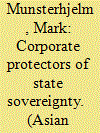

|
|
|
|
|
| Publication |
2014.
|
| Summary/Abstract |
This paper compares two related corporations' accounts of enacting sovereignty with Taiwan Aborigines. First, Mitsubishi corporate webpage histories constitute mythic origin narratives about how their patriotic founder, Yataro Iwasaki, helped the Japanese government transport munitions and troops to Taiwan in 1874 and the government rewarded him with 30 ships, starting their close relationship. These narratives about this state-centred assemblage omit why Japan sent the military expedition, which ostensibly was a punitive expedition against Paiwan Aborigines for the 1871 massacre of 54 Ryukyu Islanders, but was actually part of the new Meiji state's annexation of the Ryukyu Islands. Second, it analyses the Shung Ye Museum of Formosan Aborigines which was founded in 1994 by the wealthy chair of the Shung Ye Group, a Taiwan-based Mitsubishi-affiliated conglomerate. The museum is a private assemblage organized around hero narratives in which the chair demonstrates his patriotism by rescuing Taiwan Aborigines and their cultures. The museum contributes to the Taiwan-centred identity project which challenges One-China sovereignty claims over Taiwan.
|
|
|
|
|
|
|
|
|
|
|
|
|
|
|
|
| 2 |
ID:
131613
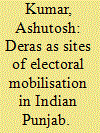

|
|
|
|
|
| Publication |
2014.
|
| Summary/Abstract |
Mushrooming of the deras in Indian Punjab, and the role of some of these deras in influencing the political choices of their followers, most of whom belong to the socially and economically marginal groups, is being recognised and apparently encouraged by the political parties. This is evident in the fact that political leaders/candidates cutting across party divides flocked to various deras in the run-up to the recent elections. This phenomenon can be attributed primarily to the fact that the social basis of political power of state has remained unaltered in favour of the upper castes/communities. Unwilling to share power, yet compelled to seek the crucial support of numerically strong and economically mobile dalit and other backward castes voters in a closely contested bi-polar polity, the upper-caste political leadership takes recourse to the 'softer' option of cultivating the deras to 'deliver' en bloc the marginal-castes votes. With one form of the identity politics based on ethno-regional communal divide having receded to background, it is the turn of the caste-based identity politics through the 'dera route' that is prevailing in post-militancy Punjab.
|
|
|
|
|
|
|
|
|
|
|
|
|
|
|
|
| 3 |
ID:
131647
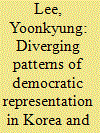

|
|
|
|
|
| Publication |
2014.
|
| Summary/Abstract |
This paper explains the difference between Korea's vocal movements and feeble parties versus Taiwan's stable parties and dependent movements from the political dynamics formed under the authoritarian state. Taiwan's party-based authoritarianism provided ground for party development but not for independent social movements. Korea's personal dictatorship was inimical to party development but engendered a contentious movement sector.
|
|
|
|
|
|
|
|
|
|
|
|
|
|
|
|
| 4 |
ID:
131616
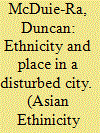

|
|
|
|
|
| Publication |
2014.
|
| Summary/Abstract |
This article explores the relationships between ethnicity, place and belonging in the city of Imphal, capital of the state of Manipur in India's Northeast border region. Manipur has experienced decades of conflict from ethno-nationalist separatism, inter-ethnic territorial disputes and counter-insurgency operations. These ethnic conflicts play out on the urban landscape of Imphal. Control of the city from above is diffused among the civilian government and the armed forces. Non-state actors such as insurgent groups and ethnic organizations exert their own control from below. On such unstable ground, struggles by residents seeking to create place and a sense of belonging affirm ethnic boundaries. These boundaries are not static and the lines between inclusion and exclusion are continually redrawn along existing and emerging fault-lines among the population. Yet these boundaries are also transcended in unusual ways that may seem trivial but in Imphal are essential to realizing alternative ways of belonging.
|
|
|
|
|
|
|
|
|
|
|
|
|
|
|
|
| 5 |
ID:
131611
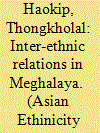

|
|
|
|
|
| Publication |
2014.
|
| Summary/Abstract |
The Indian state of Meghalaya, since its creation in 1972, had been raven by ethnic conflicts between the indigenous tribes and settler non-tribal communities. The domination of business establishments, labour force and other employment opportunities by settlers who are mainly economic migrants from Bangladesh, Nepal and other parts of India resulted in anxiousness among the native locals, resulting in three ethnic riots between indigenous tribals and settler non-tribal communities. By the turn of the twentieth century the state witnessed a relative change in the nature of relations between the ethnic communities. While the relations between the indigenous tribals and settler communities have relatively improved, ethnic tensions shifted to the indigenous tribes. This article uses the perceived threat hypothesis and a combination of rational choice theory and interpretivism to explain empirically observed realities in Meghalaya. Emphasis is placed on the post-1992 period, focusing on the emerging ethnic relations between the indigenous tribes of Meghalaya.
|
|
|
|
|
|
|
|
|
|
|
|
|
|
|
|
| 6 |
ID:
131610
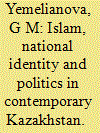

|
|
|
|
|
| Publication |
2014.
|
| Summary/Abstract |
This article argues that, unlike other Central Asian states, the official response in Kazakhstan to its Islamic revival is distinctively ambivalent and even contradictory. The Nazarbayev government has rhetorically embraced the Kazakh qoja-centred Sufi heritage and the Hanafi school of Sunni Islam as the 'traditional' forms of Islam among Kazakh nomads and perceived them as constituent elements of the nation-building process. However, the representatives of the political elite have in reality unknowingly absorbed much of 'untraditional' Salafi Islam and ignored, marginalised or even suppressed the revival of Kazakh Sufism. This is in part because of their limited knowledge of the indigenous Kazakh Islamic tradition and in part due to the younger generation's greater exposure to a range of Salafi-dominated influences emanating from abroad. The article begins with a brief historical perspective on the relationship between qoja-centred Sufism and 'Kazakh-ness' which is essential for establishing an analysis of the fissures in the current religious and political ideology pertaining to Kazakh nation-building.
|
|
|
|
|
|
|
|
|
|
|
|
|
|
|
|
| 7 |
ID:
131608


|
|
|
|
|
| Publication |
2014.
|
| Summary/Abstract |
The collapse of the USSR in the early 1990s brought statehood to peoples in the Central Asian borderlands at the interface between the former Soviet Union and the People's Republic of China. In the past two decades, the cautious opening of this once tightly sealed border has led to renewed contact between individuals of the groups sharing the 'Kyrgyz' ethnonym with other individuals from homologous groups who are now citizens of Kyrgyzstan, China (Xinjiang Autonomous Region) and Tajikistan. This article focuses on how Kyrgyz groups beyond the territorial borders of their respective states regard their belonging to a wider Kyrgyz nation. Based on data gathered in anthropological fieldwork, I discuss these groups' respective notions of meken (homeland) and chek-ara (borders) and place such narratives of inclusion and exclusion amongst Kyrgyz groups alongside local rhetoric of ethnic ascription, group affiliation and citizenship, and boundary marking in these borderlands.
|
|
|
|
|
|
|
|
|
|
|
|
|
|
|
|
| 8 |
ID:
131612
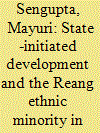

|
|
|
|
|
| Publication |
2014.
|
| Summary/Abstract |
This paper explores the wider implications of state-led development on the Reang ethnic minority in the North East Indian state of Tripura, and in doing so presents a critical view on such development endeavours. Basing itself on the study of the relationship between the state and the ethnic minorities, this research argues the following: - first, most state-led development programmes are formulated on a preconceived notion of 'backwardness' in the ethnic minorities. Second, state-led development projects create internal fissures and ruptures within ethnic minorities on issues of what constitutes development. Third, often, state-led development programmes create an image of oneself as inherently 'backward', whereby the conditioning of the mind plays an important role in extending the desire of the members of an ethnic minority to achieve this 'imagined modernity'.
|
|
|
|
|
|
|
|
|
|
|
|
|
|
|
|
|
|
|
|
|